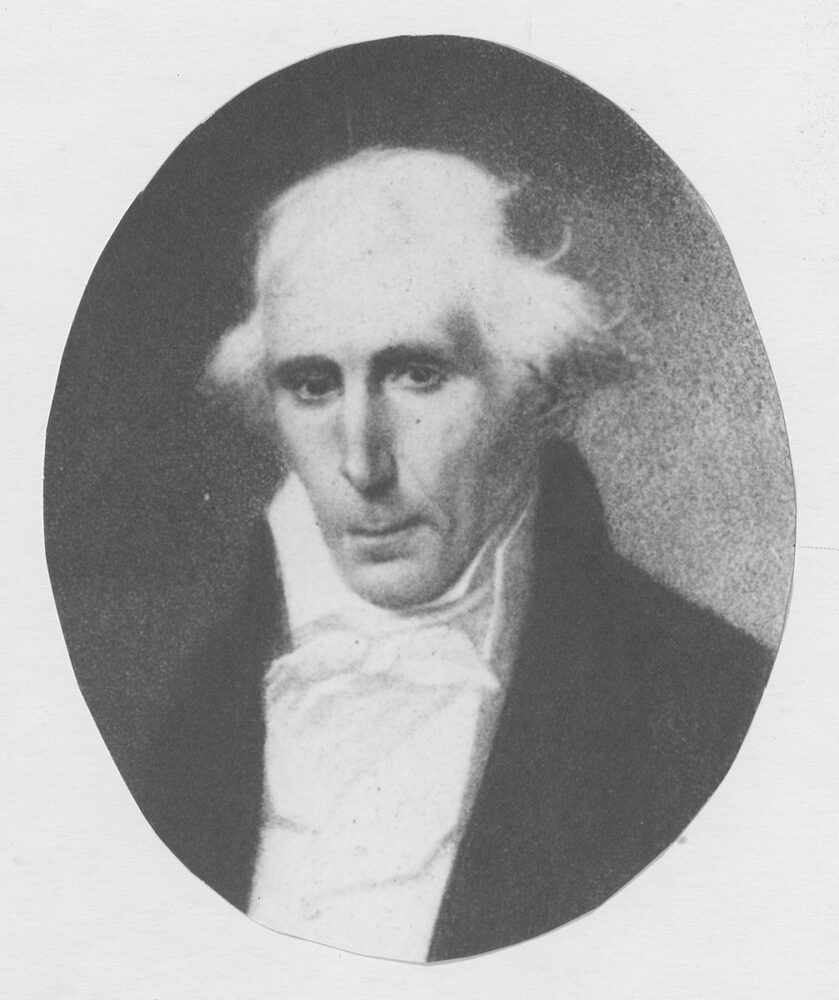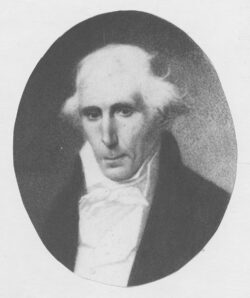Julien de Lalande Poydras
Julien de Lalande Poydras was a Point Coupée Parish plantation owner, banker, political leader, and philanthropist who was a pivotal figure in the early history of Louisiana.

State Library of Louisiana
Julien de Lalande Poydras, undated.
Julien de Lalande Poydras was a Point Coupée Parish plantation owner, banker, political leader, and philanthropist who was a pivotal figure in the early history of Louisiana, helping to shepherd the European colony to statehood and leading an array of civic institutions, some of which endure today.
Life in France and Arrival in Louisiana
Little is known of Poydras’s early life, only that he was born on April 3, 1740, to Francois Poydras and Magdeleine Simon in the town of Rezé in the Pays de la Loire region of northwestern France. He had three brothers and a sister. As a young man he enlisted in King Louis XV’s navy and, in 1760, amid the Seven Years’ War, was captured and imprisoned by the British. Poydras spent several years in jail, where he learned to speak both English and German, before escaping to Saint-Domingue via a West Indian cargo ship.
Poydras arrived in Louisiana sometime between 1768 and 1774. Peddling household goods and incidental items across the sparsely settled region, he accumulated sufficient money to purchase enslaved laborers and land in Point Coupée, a settlement thirty miles upriver from Baton Rouge. He steadily increased his holdings of both with three additional plantations in Pointe Coupée near the False River, an oxbow lake of the Mississippi, and two plantations in West Baton Rouge Parish. Poydras dedicated most of his land to cotton; only one of his Pointe Coupée properties, today named Alma, grew sugarcane. At the time of his death, he enslaved more than 1,000 persons of African descent on his plantations. Contemporaries noted that Poydras treated them “humanely and mildly,” a description contradicted by the a 1795 conspiracy in Point Coupée in which a dozen of his enslaved laborers were implicated.
Poydras also had extensive real estate holdings in New Orleans. These included a West Indian-style plantation house at Julia Street and St. Charles Avenue, which he later donated to the establishment of the Female Orphan Society, founded in 1817 for girls left homeless by the city’s yellow fever outbreaks. He also owned a townhouse fronting the river at Poydras Street—the road named upon his 1788 acquisition of the land from Bertrand Gravier. The site precipitated his involvement in what came to be known as the Batture Affair, a bitter land-use controversy over a sandy tract fronting the Mississippi River above the French Quarter. As the legal battle gained national import, Poydras sided with then-President Thomas Jefferson that the land should remain municipal property. This civic-minded position charted the fate of the city’s waterfront and, more broadly, established far-reaching legal precedents concerning public versus private land rights. In addition to his Faubourg St. Mary real estate, Poydras also owned properties in the Vieux Carré, where he served as the original president of the Banque de la Louisiane, chartered in 1804 as the Louisiana Territory’s first financial institution.
Political Life
Poydras demonstrated an early interest in Louisiana’s political autonomy. Following the Revolutionary War, he penned La Prise du Morne du Baton Rouge, a 1779 paean, or lyric poem, honoring Don Bernardo de Gálvez’s victory over the British in the Battle of Baton Rouge. Published by Antoine Bourousquié, printer to King Carlos III and Louisiana’s Spanish royal government, the poem is considered the first literary imprint in the state. A quarter century later Poydras presided over the First Legislative Council of the Territory of Orleans, a provisional lawmaking body established by Congress in 1804. Under Poydras’s leadership the legislature passed an act to establish a public school system—the first territory in the country to do so. He subsequently served as the second (and final) at-large delegate to the US House of Representatives, presenting the successful petition for Louisiana statehood in 1810. As president of Louisiana’s constitutional convention, he oversaw the drafting of the state’s founding document and, following Louisiana’s admission to the Union in 1812, became the inaugural president of the state senate.
Legacy
Poydras died a 78-year-old bachelor at his Pointe Coupée plantation home on June 23, 1824. While initially interred in the cemetery of St. Francis Church, the steady encroachment of the Mississippi River on the burial site led to the exhumation and relocation of his remains to the grounds of Poydras Academy, later Poydras High School, in 1891.
Poydras left most of his fortune to civic institutions in Point Coupée and Orleans Parishes. To New Orleans’s Charity Hospital and the Female Orphan Society (today’s senior living provider, Poydras Home), he bequeathed properties intended to be leased or sold for revenue. In New Roads, Point Coupée’s parish seat, he donated funds to establish the state’s first endowed college. Established in his name in 1829, the institution ceased operations during the Civil War. The never-married Poydras also established a dowry fund for select brides in Pointe Coupée and West Baton Rouge Parishes, reportedly on account of his failure as a young man in France to wed the pennilessness object of his affection.
Concerning his investment in human chattel, Poydras instructed in his will that no enslaved laborers should be sold separately from their respective plantations and that, after twenty-five years, each property’s workers would be emancipated and pensioned. After several subsequent owners failed to honor the stipulations, his nephew Benjamin Poydras de la Lande initiated suits on the bondspeople’s behalf ensuring they received annuities (annual court-ordered payments).
